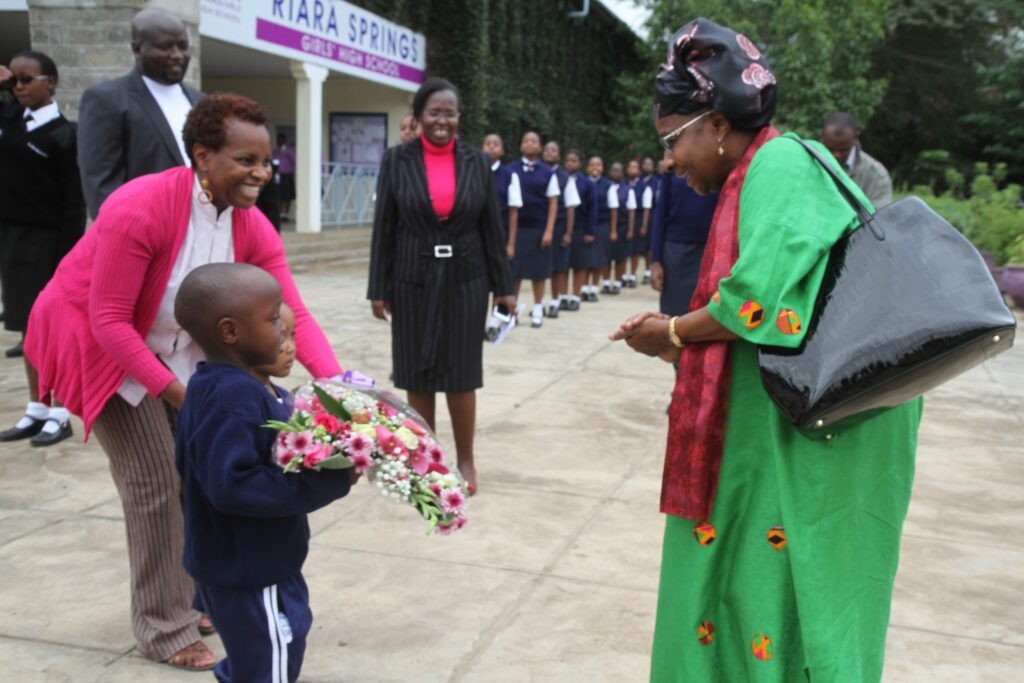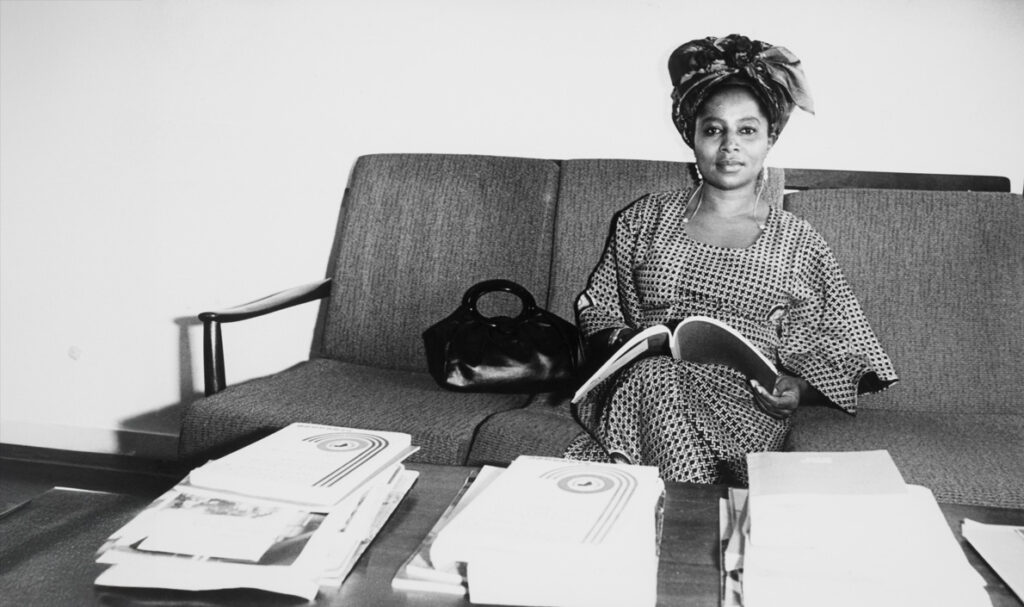An advocate for transformative changeAbout Mĩcere Gĩthae Mũgo
Professor Mĩcere Gĩthae Mũgo was born on December 12, 1942, in Kirinyaga, Kenya
She was the third-born child of Senior Chief Richard Karuga Gĩthae and Mwalimu Grace Njeri Gĩthae. Mĩcere was a sibling to 6 sisters, 3 brothers, and both father and mother to Mũmbi and the late Njeri Kui whom she both described as her “comrades” and best friends. At the time of her birth, the world was contending with the crises and consequences of trisecting national, continental, and global events: the Second World War, colonial expansionism, and the rising resistance against it.
When Mĩcere turned ten in 1952, the same year the State of Emergency was declared in Kenya, she witnessed one of the most violent periods in her country’s history. The Kenya Land and Freedom Army, popularly known as the Mau Mau, had intensified its resistance against colonial occupation and brutality and Mĩcere had just joined Embu Girls’ School, which was at the heart of this war. She would remain at Embu in the Eastern region of the country from 1955 – 1957.


Alliance Girls’ High School, 1957-1960
Though colonialism was coming to an end during this period, the British colonial establishment remained convinced that Black Africans were not as intellectually capable as their white counterparts. To test this racist theory, Mĩcere found herself thrust in the middle of what would become the educational desegregation project in Kenya, like the Civil Rights movement in the United States and in particular the “Little Rock 9”. Mĩcere was selected as the first and only African child to attend Limuru Girls’ High School, then an all-white girls’ high school. Mĩcere emerged as the top student at Limuru, earning herself a scholarship to Oxford University. To the surprise of many, Mĩcere declined this scholarship, opting instead in 1963 to go to Makerere University in Kampala, Uganda.
At Makerere she studied under John Mbiti, Okot p’Bitek, and David Cook, among others. It was here, where some of her earliest poems were broadcast on BBC, recognition that earned her prominence amongst her peers. Vocal in student affairs and active in the performing arts, Mĩcere stood out and was recognized as a leading voice amongst politically and artistically active students. Later, she became the first female editor of PenPoint, a literary journal in the English Department.
Mĩcere enrolled for a post-graduate diploma in education at the University of Nairobi in September 1966, a program that she would later lament “had a progressive vision meant to produce teachers who would decolonize education, professionals who were ingrained in the philosophy of ‘education for liberation,’ very much in line with Paulo Freire’s ideas in “Pedagogy of the Oppressed”.
The University of New Brunswick
Mĩcere left Kenya for Canada in 1969 to pursue higher education at the University of New Brunswick, where she was introduced to African American and Caribbean writings, and the growing culture of letters in the Black diaspora. This intellectual climate expanded her connections to the Black Arts Movement, providing her with the opportunity to connect struggles of African Americans to those of liberation movements around the world, especially to those in southern African countries.
Mĩcere became deeply involved with revolutionary movements, fighting for the independence of Namibia, Angola, Mozambique, Zimbabwe, and South Africa.
"Our research, scholarship, and search for knowledge, should take us to as many sites of knowledge as possible, even if this means moving outside our own comfort zones."
Micere returned to Kenya in 1973, becoming the first East African to hold a PhD in Literature.
In September 1973, Mĩcere joined the department of literature at the University of Nairobi as a lecturer.
In the decade that followed, she would engage, train, and influence a generation of students and lecturers.

Beginning of involvement
Elected Dean
Attempted coup
Exile
Move to Zimbabwe
Post-exile in North America
Scroll to view more
Numerous awards & recognitions
Mĩcere’s nurturing spirit and indomitable will touched communities and institutions worldwide, resulting in numerous awards including:
- A proclamation from the Mayor’s Office that July 29, 2023, would be designated as Mĩcere Gĩthae Mũgo Day in the City of Syracuse
- Lifetime Achievement Award from the Human Rights Defenders, the Defenders Coalition, and the Embassy of Sweden in Kenya in 2022
- Lifetime Achievement in African Literature award from the Royal African Society in 2021
- Elder of the Burning Spear medal from the Government of Kenya in 2013
- Flora Nwapa Award for Literary Work That Transcends Culture, Boundary, and Perception from the African Literature Association in 2013
- Mwalimu Julius Nyerere Distinguished Lecturer Award from the University of Dar es Salaam in 2012
- Award for Excellence in Master Level Teaching from the College of Arts and Sciences, Syracuse University in 2011
- Lifetime Achievement Award from the Pan African Studies Program of Syracuse University in 2010
- Central New York (CNY) Women of Distinction Award for contributions to the Syracuse community in 2008
- Distinguished Africanist Award from the New York African Studies Association in 2007
- Cited among “The Top 100: They Influenced Kenya Most” during the 20th Century by the East African Standard Century publication in November 2002
Achievements
During the course of her academic career, Mĩcere served as a supervisor for a large number of dissertations, graduate thesis, undergraduate thesis, honours thesis, and special projects at the five primary universities where she taught, namely, University of Nairobi, St. Lawrence University, University of Zimbabwe, Cornell University and Syracuse University. Mῖcere has been elected or selected to serve in at least 350 distinguished roles on international bodies and or organisations in recognition of her professional experience and skills, including: board directorships; programme directorships; academic and literary advisory boards; UN advisory boards; numerous consultancies, and others.
Prof. Mĩcere Gĩthae Mũgo was the author, editor/co-author of several books. She published up to 80 book chapters/papers and gave numerous global keynote and guest speaker addresses over her lifetime. She was a poet, playwright, and literary critic who published seven books, eight co-edited supplementary school readers, five monographs, and edited the journal, Third World in Perspective. With over 200 publications in the form of book chapters, journal articles, and interviews; she was a member of at least 60 professional organisations and served on at least 150 international executive boards, directorships, and councils, many of which she chaired or presided over.
Prof. Mĩcere Gĩthae Mũgo’s embodiment of utu/ubuntu and her efforts to promote education, human rights, and equity across international borders endeared her to many, earning her a slew of honours and recognition in Kenya, regionally, throughout Africa, and worldwide.
Mũgo attributed her belief in building communities wherever she was, to her late mother, Grace Njeri Gĩthae, who after the passing of Mῖcere’s father, during the first year of exile, said to her daughter during a phone call: “You who have chosen the path of people’s struggles must find the courage to build new homes and begin new lives wherever you are.”
In 2020, Prof. Mĩcere Gĩthae Mũgo’s was nominated and conferred with a Doctor of Letters honorary degree in Literature (DLLit) from her alma mater, the University of Nairobi and lauded for her dedication to teaching, research, and community engagement.
In 2024, she was awarded a posthumous Doctorate degree in Languages, Linguistics and Literature from the University of South Africa (UNISA) in recognition of her commitment to the pursuit of African Excellence upholding the values of integrity, empathy, and solidarity in academia and beyond.
Professor Githae Mũgo continued to be an agent of positive change in the lives of individuals and communities worldwide, and remained passionate about excellence in the humanities and social sciences. She passed away on June 30, 2023 after long battle with multiple myeloma.
Become the spark
that ignites transformation
Your impact can help set change in motion.